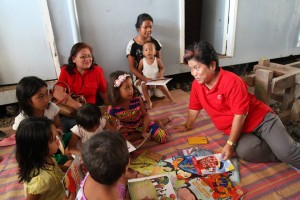
MANILA — Department of Social Welfare and Development (DSWD) Secretary Corazon J. Soliman and Australia’s Department of Foreign Affairs and Trade (DFAT) Deputy Secretary Ewen McDonald led Wednesday the project launching of the Australian grant of AUD 12 million for the construction of early childhood and development center in the town of Alangalang, Leyte.
“The launching is part of the effort to construct and bring kids back to classrooms and out of the tents,” Secretary Soliman said, adding that the construction will be conducted under the Kapit-Bisig Laban sa Kahirapan-Comprehensive and Integrated Delivery of Social Services-National Community-Driven Development Program (KC-NCDDP).
The project, which will run from 2014 to 2019, is also part of the national government’s post-disaster recovery and rehabilitation efforts following typhoon “Yolanda” last November.
The DSWD chief said the funding for the construction of early childhood and development centers will come from the Australian government’s grant of AUD 12 million.
“That will be for the construction of approximately 468 classrooms and day care centers in communities where significant gaps of education have been noted and wherein KALAHI CIDSS-NCDDP will be implemented,” she said.
Part of the criteria for funding is that the communities should have beneficiaries of the Pantawid Pamilyang Pilipino Program (4Ps), another poverty alleviation program of the DSWD that provides conditional cash transfer (CCT) funds to qualified families so they can support the health and education of their children.
Under the agreement between DFAT and DSWD, approximately 117 of the target 468 classrooms and day care centers will be constructed in “Yolanda”-affected areas.
“This project shows the continuing strong partnership between us and the Australian government to respond to our country’s continuing problems with poverty and lack of education. Through these school buildings and day care centers, we are not only helping provide for the supply side requirement of 4Ps, we are also taking steps to ensure that these children, particularly those who have been affected by ‘Yolanda’, will have a fighting chance for a better future,” the DSWD chief said.
Prior to the provision of the Australian government grant, the DFAT had already extended a AUD 10-million grant in 2012 to KALAHI-CIDSS for the construction of school buildings and day care centers in 200 municipalities.
Originally meant to cover the construction of 515 of said structures, KALAHI-CIDSS was able to implement 626 or 122 percent of the target, through savings, generated partly because of the community-driven development (CDD) strategy of the program, under which residents themselves work together to implement their identified sub-project.
The day care centers and school buildings benefited at least 102,213 households, with 15,584 students able to study in the said educational facilities.
KC-NCDDP is the expanded version of the Kalahi-CIDSS, piloted by the national government in 2002 and launched in 2003 to alleviate poverty in poor rural communities using the CDD approach.
Under the CDD approach, the capacities of local residents are heightened so they will be able to lift their own communities out of poverty, giving them the opportunity to make informed decisions on locally identified options for development and manage resources to implement sub-projects that address the needs they have identified.